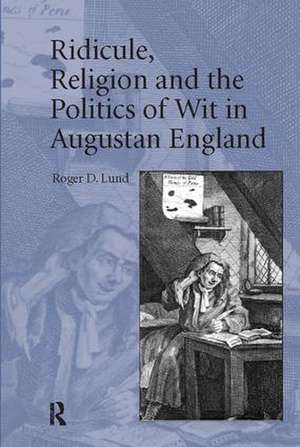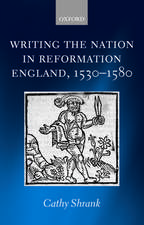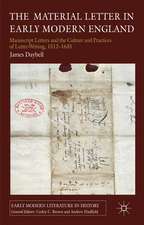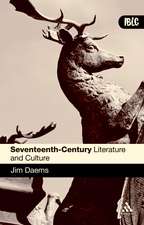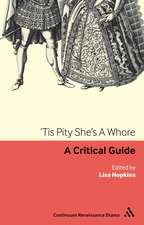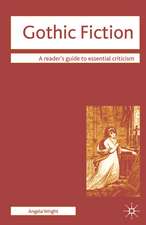Ridicule, Religion and the Politics of Wit in Augustan England
Autor Roger D. Lunden Limba Engleză Paperback – 24 mai 2017
| Toate formatele și edițiile | Preț | Express |
|---|---|---|
| Paperback (1) | 416.22 lei 6-8 săpt. | |
| Taylor & Francis – 24 mai 2017 | 416.22 lei 6-8 săpt. | |
| Hardback (1) | 1060.25 lei 6-8 săpt. | |
| Taylor & Francis – 28 apr 2012 | 1060.25 lei 6-8 săpt. |
Preț: 416.22 lei
Nou
Puncte Express: 624
Preț estimativ în valută:
79.67€ • 86.57$ • 66.97£
79.67€ • 86.57$ • 66.97£
Carte tipărită la comandă
Livrare economică 21 aprilie-05 mai
Preluare comenzi: 021 569.72.76
Specificații
ISBN-13: 9781138118317
ISBN-10: 1138118311
Pagini: 264
Dimensiuni: 156 x 234 x 14 mm
Greutate: 0.45 kg
Ediția:1
Editura: Taylor & Francis
Colecția Routledge
Locul publicării:Oxford, United Kingdom
ISBN-10: 1138118311
Pagini: 264
Dimensiuni: 156 x 234 x 14 mm
Greutate: 0.45 kg
Ediția:1
Editura: Taylor & Francis
Colecția Routledge
Locul publicării:Oxford, United Kingdom
Notă biografică
Roger D. Lund is Professor of English at Le Moyne College, Syracuse, NY. He is editor of The Margins of Orthodoxy (1995) and Gulliver's Travels: A Sourcebook (2006).
Recenzii
'Alternately feared as an agent of subversion and admired as the begetter of geniality and social cohesion, wit defined eighteenth-century public discourse and evoked cultural anxieties. With encyclopedic erudition, Roger D. Lund lucidly delineates wit's ascendant role during the long eighteenth century.' Anna Battigelli, SUNY Plattsburgh, USA ’Lund provides an impressively rich and nuanced reading of wit and religion in the eighteenth century, making important qualifications to Habermasian and sentimental accounts of publicity, and restoring to Augustan wit some of its bite.’ Review of English Studies ’...a remarkably well-researched and lucidly written study of how the concept of ’wit’ served as a contentious floating signifier in seventeenth- and eighteenth-century England.’ Notes and Queries '... erudite and compact. The list of primary sources is extensive ... Extensively annotated, richly illustrated with quotations from a wide variety of sources, and innovative in its inclusion of works of philosophy, religious pamphlets and legal writing, Ridicule, Religion and the Politics of Wit in Augustan England is an important contribution to our understanding of one of the most characteristic and contentious features of the Augustan period - the decorum and function of witty discourse.' English Studies
Cuprins
Introduction; Chapter 1 The Bite of Leviathan; Chapter 2 Libertine Wit and the Collier Stage Controversy; Chapter 3 The Titans of Wit; Chapter 4 Shaftesbury and the Gentility of Wit; Chapter 5 The Trammels of Christian Wit; Chapter 6 The Hermeneutics of Censorship and the Crime of Wit;
Descriere
Arguing for wit's importance beyond its use as a literary device, Lund traces the process by which writers in Restoration and eighteenth-century England struggled to define an appropriate role for wit in the public sphere. He shows how fear of wit as a subversive rhetorical form threatening church and state resulted in attacks on heterodox writers, the Restoration stage and new communal venues such as coffee houses and clubs.
